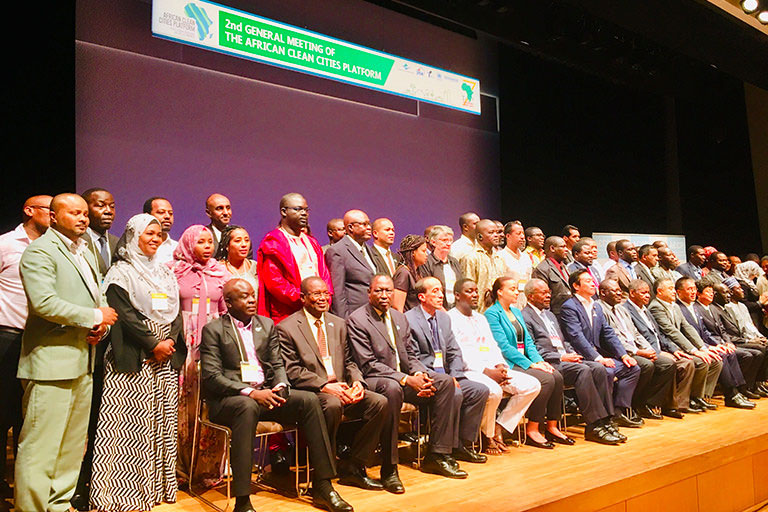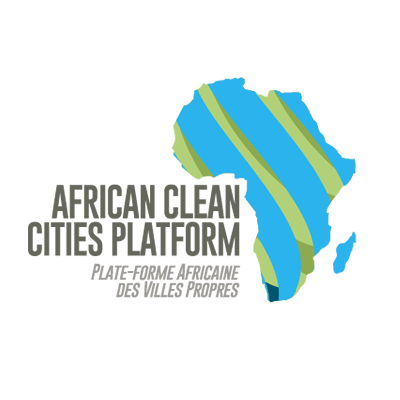26-27 August 2019
Second ACCP General Meeting in Yokohama Japan, 2019

The second general meeting of the African Clean Cities Platform (ACCP) was held in Yokohama in August 2019, in conjunction with TICAD 7 (the seventh Tokyo International Conference on African Development). More than 450 people attended the main conference held on August 26-27, including 38 African countries, representatives of development partners, the private sector, and Japanese municipalities, and had an intensive discussion on the theme of "Sustainable Waste Management Towards a Clean and Resilient City.“
On the first day, after the opening session, Japanese and international waste management companies presented their business applications in Africa. Afterward, the Guidebook for Environmental Education on Solid Waste Management in Africa was launched and good practices of environmental education and public awareness activities in Africa and Japan were shared. In addition, the Basics of Municipal Solid Waste Management in Africa, the guide that aims to provide a brief overview and basic knowledge on municipal solid waste for practitioners, was also distributed among the participants.
The second day opened with part of the data book launch session on Africa Solid Waste Management Data Book 2019, including the presentation of case studies and a discussion on waste management in developing countries. In the afternoon, the mobilization of funds and measures to raise policy priorities for improved SWM were addressed by development partners associated with intensive Q&A.
To conclude the two-day meeting, H.E. Mr. Yoshiaki Harada, Minister of Environment of Japan, the co-organizing organizations, and representatives of African countries made statements to promote the activities of the ACCP. At the end of the closing session, the “Yokohama Action Guidance for the ACCP” It stipulates the future direction and concrete activities such as expanding the network through the participation of development partners and other stakeholders, strengthening the ACCP secretariat function in Africa with UN-Habitat taking the lead role, providing opportunities for capacity building and knowledge co-creation, etc. As a result, the Yokohama Declaration and Yokohama Action Plan, which are TICAD7 deliverables, reaffirmed the need to address environmental issues, including improved waste management.
During the meeting, a special knowledge-sharing session on waste management for African participants (25), a workshop on Sustainable Development Goal indicators (28), a field visit to waste management facilities in Yokohama (29), and an exhibition of environmental picture books drawn by African children were also organized. This intensive program provided participants with practical, useful, and inspiring knowledge, albeit in a short period of time.
Program & Presentations
Session 1: Sharing Experience and Applicable Solutions
Mr. Yutaka Matsuzawa, Deputy Director General, Environmental Regeneration & Material Cycles Bureau, Ministry of the Environment, Japan
Outcome of the G20 Summit and Waste Management Policy in Japan
<Business Applications in Africa>
Ms. Huang Jinghui, SATO Business Division PMO, LIXIL Corporation
”SATO” Social Business in Africa
Mr. Michael Lwoyelo, Sanergy
Solving the Waste Management Crisis in Booming Cities through the Circular Economy
Dr. Joseph Siaw Agyepong, Executive Chairman, Jospong / Zoomlion Groups
Zoomlion - Driving Impactful Waste Management in Ghana and Africa
<Innovative Technologies>
Session 2: Education and Public Awareness for Waste Management
<Efforts and Achievements in Africa>
<UN’s Effort to Achieve Waste SDGs>
Mr. Andre Dzikus, Coordinator, Urban Basic Services Branch, UN-Habitat
Waste Wise Cities Campaign and ACCP as a Platform to Achieve Waste SDGs
Ms. Ludgarde Coppens, Head, SDG Data and Information Unit, Science Division, UNEP
Improving Waste Data and Awareness in the Context of the Agenda 2030
Keynote Lecture
Emer. Prof. Yasushi Matsufuji, Fukuoka University
Rehabilitation of Landfill Site by “Fukuoka Method” in Addis Ababa, Ethiopia
<Waste Data Management in Developed Countries>
Mr. Nobuyuki Konuma, Deputy Director, Office for Promotion of Sound Material Cycle Society, MOEJ
National Level Data Management in Japan
<Panel Discussion on Impact of Waste Data in Developing Countries Waste Data Management in Developed Countries>
TOPICS:
- How Can We Utilize Waste Data for Policy Intervention in SWM?
- What are the Challenges to Establish a System for Appropriate Monitoring and Comprehensive Analysis of SWM Related SDGs in Africa?
Panelists:
- Mr. Isaac Muraya, Director of Environment, Nairobi City County Government, Kenya
- Mr. Kazushige Endo, Director, UNCRD
- Ms. Ludgarde Coppens, Head, SDG Data and Information Unit, Science Division, UNEP
- Ms. Nao Takeuchi, Associate Expert, Waste Management Unit, Urban Basic Services Branch, UNHabitat
Session 4: Financing in Africa
Prof. Abdouraman Bary , Regional Office of Africa, UNEP
UNEP Fund Raising Strategy for Supporting Waste
Mr. Andre Dzikus, Coordinator, Urban Basic Services Branch, UN-Habitat
UN Habitat’s Urban Basic Services Trust Fund for Project Preparation
Mr. Sameh Wahba, Global Director, Urban, Disaster Risk Management, Resilience and Land Global Practice, World Bank
World Banks’s Financing Solid Waste Management in Africa
